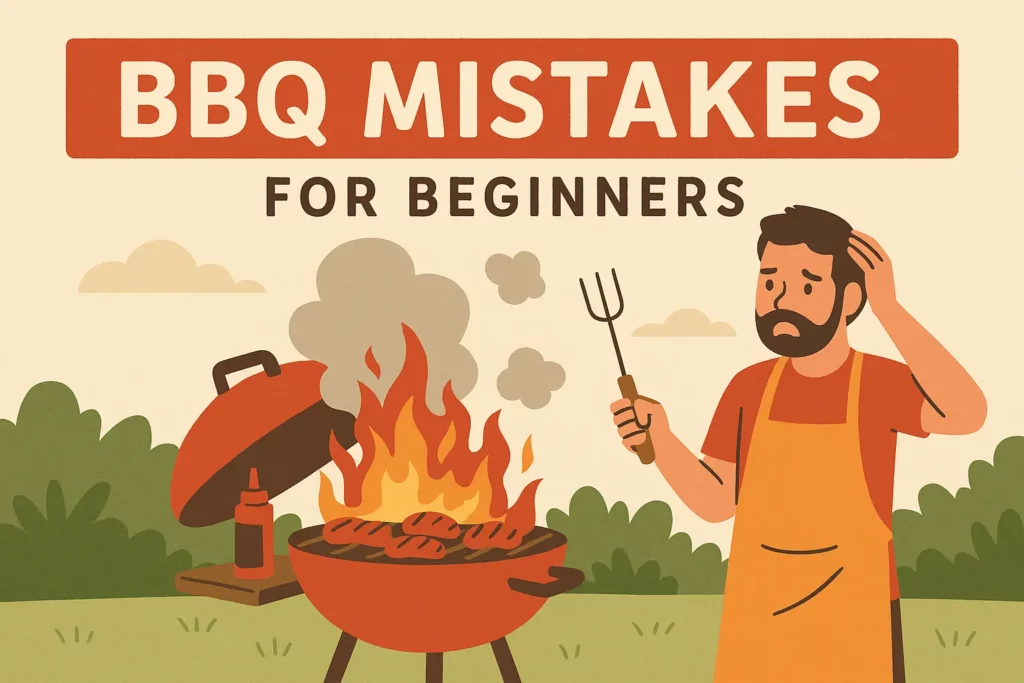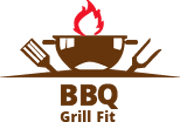This post may contain affiliate links. If you use these links to buy something we may earn a small commission. Thanks.
Grilling is more than just a way to cook it’s a tradition, a passion, and for many, a lifestyle. The sizzle of meat hitting hot grates, the smokey aroma drifting through the air, and the pride of feeding friends and family make BBQ a favorite activity across the world. But for beginners, the path to becoming a BBQ pro can be littered with mistakes that lead to dry chicken, burnt ribs, or undercooked burgers.
This comprehensive guide highlights the top BBQ mistakes beginners make and, most importantly, how to avoid them. Whether you’re firing up a charcoal kettle, gas grill, or pellet smoker for the first time, avoiding these errors will instantly improve your results.
Not Preheating the Grill
Mistake: Throwing food on a cold grill.
Why It Matters: Preheating the grill is one of the most overlooked steps, yet it’s critical for consistent cooking, proper searing, and food safety. Cold grates result in sticking, uneven cook times, and poor grill marks.
Tips to Get It Right:
- Gas Grill: Preheat for at least 10–15 minutes on high.
- Charcoal Grill: Wait until coals are covered in a light ash (typically 15–20 minutes).
- Pellet Grill: Allow at least 15 minutes to heat and build up smoke.
A hot grill ensures the surface is sanitized, gives a nice sear, and helps prevent food from sticking.

Cooking Meat Straight from the Fridge
Mistake: Tossing ice-cold meat directly onto the grill.
Why It Matters: Cold meat can cause uneven cooking—burnt outside, raw inside. It also takes longer to reach safe internal temps, often leading to dry exteriors.
Fix It:
- Let meat rest at room temperature for 30–45 minutes before grilling.
- This ensures even cooking and helps seasonings penetrate better.
Using Too Much Lighter Fluid
Mistake: Drenching charcoal in lighter fluid and lighting it up.
Why It Matters: While lighter fluid may ignite fast, it often leaves a chemical taste on your food and releases unwanted toxins.
Safer Alternatives:
- Charcoal Chimney Starter: Use newspaper or fire starters below the chimney for safe ignition.
- Electric Starter: Heat coals directly without chemicals.
- Natural fire starters: Wood wool, paraffin cubes, or compressed sawdust blocks.
Avoid lighting your BBQ with anything you wouldn’t want to eat.
Flipping Too Frequently
Mistake: Constantly flipping the meat every 30 seconds.
Why It Matters: Frequent flipping interrupts the Maillard reaction (the chemical process that creates a delicious sear and crust). It can also lead to uneven cooking and broken food.
Best Practice:
- Flip once or twice, depending on the thickness and doneness level.
- For steaks and burgers, flip after 2–4 minutes per side for medium-rare.
- Use a timer to stay consistent.
Pressing Down on Meat with a Spatula
Mistake: Pressing burgers or steaks flat with your spatula.
Why It Matters: Every press squeezes out flavorful juices. While it may sound satisfying, it dries out the meat and reduces flavor.
What to Do Instead:
- Let the grill do its job.
- Only press if you’re doing smash burgers and even then, only at the very beginning of cooking.
Not Using a Meat Thermometer
Mistake: Guessing doneness by color or touch.
Why It Matters: Visual cues can be misleading. Burgers may look brown on the outside but remain undercooked internally, posing a food safety risk.
Solution:
- Use an instant-read digital thermometer.
- Know your temperatures:
| Meat Type | Safe Internal Temp |
|---|---|
| Chicken | 165°F |
| Ground Beef | 160°F |
| Steaks (med-rare) | 130–135°F |
| Pork Chops | 145°F |
| Brisket | 195–205°F (for tenderness) |
Investing in a meat thermometer is one of the best decisions for a BBQ beginner.
Overcrowding the Grill
Mistake: Placing too many items on the grill at once.
Why It Matters: Crowding prevents proper airflow and heat distribution. Instead of searing, your food ends up steaming, making it soggy and gray instead of caramelized and brown.
Tip:
- Leave at least 1 inch between items.
- Cook in batches if needed.
- Always leave space for moving food from hot to cool zones.
Skipping the Resting Period
Mistake: Cutting into meat right after pulling it off the grill.
Why It Matters: Meat continues to cook slightly after it’s removed from heat. Resting allows juices to redistribute, resulting in a moist and flavorful final product.
Resting Guide:
- Steaks: 5–10 minutes
- Chicken: 5–8 minutes
- Brisket or pork shoulder: 20–30 minutes, tented loosely with foil
Let your meat rest on a cutting board—never skip this step.
Using Sugary Sauces Too Early
Mistake: Slathering BBQ sauce on meat right from the start.
Why It Matters: Most BBQ sauces contain sugar, which burns quickly and turns bitter at high temperatures.
When to Add Sauce:
- During the last 5–10 minutes of cooking.
- Or baste after searing and rest before serving.
You can also try low-sugar rubs or marinades to build flavor without risking burnt crusts.
Ignoring the Hot and Cool Zones
Mistake: Cooking everything over direct, high heat.
Why It Matters: Not all foods benefit from direct heat. Some require slow, indirect cooking, especially thicker cuts or bone-in meats.
Two-Zone Grilling:
- Direct Heat Zone: For searing, burgers, veggies, thin steaks.
- Indirect Heat Zone: For slow-cooking chicken, ribs, or sausages.
Pellet grills often offer automatic indirect heat, but even gas and charcoal grills can be arranged with this method.
Not Cleaning the Grill Properly
Mistake: Leaving food residue or grease buildup on grates.
Why It Matters: Dirty grills affect taste, increase flare-ups, and harbor bacteria. A clean grill ensures better flavor, longer lifespan, and a safer experience.
Cleaning Routine:
- Preheat and scrape grates with a grill brush before each use.
- Wipe down grates with oil-soaked paper towel using tongs.
- Deep-clean every few weeks—especially drip trays, grease traps, and burner covers.
Avoid using harsh chemicals—opt for natural degreasers or a vinegar/baking soda solution.
Choosing the Wrong Cuts of Meat
Mistake: Selecting tough or lean cuts for high-heat grilling.
Why It Matters: Not all meats behave the same on the grill. Lean cuts dry out quickly, and tough cuts may require long, slow cooking to become tender.
Beginner-Friendly Cuts:
- Ribeye, NY Strip, or T-Bone for steaks
- Chicken thighs over breasts
- Pork tenderloin or pork ribs
- Sausages or brats
- Avoid overly lean or thin cuts unless you’re cooking quickly over high heat.
Using Poor-Quality Fuel or Pellets
Mistake: Using cheap, damp, or artificial charcoal and pellets.
Why It Matters: Low-quality fuel can produce chemical-tasting smoke, burn unevenly, and clog your grill with ash. Your fuel is a flavor source—treat it with care.
Tips:
- Choose 100% hardwood pellets (no fillers or artificial binders).
- Store fuel in a sealed, dry container.
- For charcoal, go with lump charcoal or high-quality briquettes.
Lack of Patience
Mistake: Rushing the process.
Why It Matters: Great BBQ takes time. Impatience leads to turning meat too early, cooking at too high heat, or serving underdone food.
How to Slow Down:
- Use a timer.
- Plan your cook ahead of time.
- Let smoke, heat, and seasoning do their work.
Trust the process—your tastebuds will thank you.
Conclusion
BBQ is both art and science. While the flames, smoke, and sizzle may look simple, it takes knowledge and practice to master the grill. Avoiding the common mistakes above will immediately elevate your grilling skills and lead to better meals, happier guests, and greater confidence.
Remember:
- Preheat your grill
- Use a thermometer
- Let your meat rest
- Don’t rush the process
Grilling is about more than cooking it’s about experience, fun, and flavor. Start with the basics, learn from your mistakes, and before long, you’ll be the one giving out BBQ advice at your next cookout.
